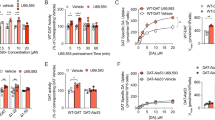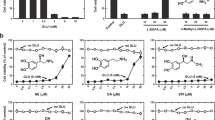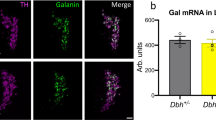Abstract
Both in vivo and in vitro studies have shown the beneficial effects of the delta-opioid receptor (DOR) on neurodegeneration in hypoxia/ischemia. We previously reported that DOR stimulation with [(D-Ala2, D-Leu5) enkephalin] (DADLE), a potent DOR agonist, for both a short (minutes) and long (days) time has notable protective effects against sodium azide (NaN3)-induced cell injury in primary cultured rat cortical neurons. We further demonstrated that short-term DADLE stimulation increased neuronal survival through the PKC-mitochondrial ERK pathway. However, the mechanisms underlying long-term neuroprotection by DADLE remain unclear. Here, we showed that DOR stimulation with DADLE (0.1 μmol/L) for 2 d selectively activates the PI3K/Akt/NF-κB pathway in NaN3-treated neurons; this activation increased Bcl-2 expression, attenuated Cyto c release and promoted neuronal survival. Further investigation revealed that sustained DADLE stimulation increased Bcl-2 expression by enhancing NF-κB binding to the Bcl-2 promoter and upregulating the histone acetylation levels of the Bcl-2 promoter. Our results demonstrate that prolonged DADLE exposure epigenetically promotes Bcl-2 expression and elicits neuroprotective effects in the NaN3 model via the PI3K/Akt/NF-κB pathway.
Similar content being viewed by others
Log in or create a free account to read this content
Gain free access to this article, as well as selected content from this journal and more on nature.com
or
References
Zhang J, Haddad GG, Xia Y. delta-, but not mu- and kappa-, opioid receptor activation protects neocortical neurons from glutamate-induced excitotoxic injury. Brain Res 2000; 885: 143–53.
Law PY, Wong YH, Loh HH. Molecular mechanisms and regulation of opioid receptor signaling. Annu Rev Pharmacol Toxicol 2000; 40: 389–430.
Zhang J, Qian H, Zhao P, Hong SS, Xia Y. Rapid hypoxia preconditioning protects cortical neurons from glutamate toxicity through delta-opioid receptor. Stroke 2006; 37: 1094–9.
Ma MC, Qian H, Ghassemi F, Zhao P, Xia Y. Oxygen-sensitive {delta}-opioid receptor-regulated survival and death signals: novel insights into neuronal preconditioning and protection. J Biol Chem 2005; 280: 16208–18.
Zhang J, Gibney GT, Zhao P, Xia Y. Neuroprotective role of delta-opioid receptors in cortical neurons. Am J Physiol Cell Physiol 2002; 282: C1225–34.
Drolet G, Dumont EC, Gosselin I, Kinkead R, Laforest S, Trottier JF. Role of endogenous opioid system in the regulation of the stress response. Prog Neuropsychopharmacol Biol Psychiatry 2001; 25: 729–41.
Peng PH, Huang HS, Lee YJ, Chen YS, Ma MC. Novel role for the delta-opioid receptor in hypoxic preconditioning in rat retinas. J Neurochem 2009; 108: 741–54.
Zhu M, Li M, Yang F, Ou X, Ren Q, Gao H, et al. Mitochondrial ERK plays a key role in delta-opioid receptor neuroprotection against acute mitochondrial dysfunction. Neurochem Int 2011; 59: 739–48.
Narita M, Kuzumaki N, Miyatake M, Sato F, Wachi H, Seyama Y, et al. Role of delta-opioid receptor function in neurogenesis and neuroprotection. J Neurochem 2006; 97: 1494–505.
Chao D, Balboni G, Lazarus LH, Salvadori S, Xia Y. Na+ mechanism of delta-opioid receptor induced protection from anoxic K+ leakage in the cortex. Cell Mol Life Sci 2009; 66: 1105–15.
Chao D, Bazzy-Asaad A, Balboni G, Salvadori S, Xia Y. Activation of DOR attenuates anoxic K+ derangement via inhibition of Na+ entry in mouse cortex. Cereb Cortex 2008; 18: 2217–27.
Chao D, Donnelly DF, Feng Y, Bazzy-Asaad A, Xia Y. Cortical delta-opioid receptors potentiate K+ homeostasis during anoxia and oxygen-glucose deprivation. J Cereb Blood Flow Metab 2007; 27: 356–68.
Chao D, Bazzy-Asaad A, Balboni G, Xia Y. delta-, but not mu-, opioid receptor stabilizes K+ homeostasis by reducing Ca2+ influx in the cortex during acute hypoxia. J Cell Physiol 2007; 212: 60–7.
Ke S, Dian-san S, Xiang-rui W. Delta opioid agonist [D-Ala2, D-Leu5] enkephalin (DADLE) reduced oxygen-glucose deprivation caused neuronal injury through the MAPK pathway. Brain Res 2009; 1292: 100–6.
Heiss A, Ammer H, Eisinger DA. delta-Opioid receptor-stimulated Akt signaling in neuroblastoma x glioma (NG108-15) hybrid cells involves receptor tyrosine kinase-mediated PI3K activation. Exp Cell Res 2009; 315: 2115–25.
Lv MR, Li B, Wang MG, Meng FG, Yu JJ, Guo F, et al. Activation of the PI3K-Akt pathway promotes neuroprotection of the delta-opioid receptor agonist against cerebral ischemia-reperfusion injury in rat models. Biomed Pharmacother 2017; 93: 230–7.
Zhu M, Li MW, Tian XS, Ou XM, Zhu CQ, Guo JC. Neuroprotective role of delta-opioid receptors against mitochondrial respiratory chain injury. Brain Res 2009; 1252: 183–91.
Zhu L, Derijard B, Chakrabandhu K, Wang BS, Chen HZ, Hueber AO. Synergism of PI3K/Akt inhibition and Fas activation on colon cancer cell death. Cancer Lett 2014; 354: 355–64.
Safiulina D, Veksler V, Zharkovsky A, Kaasik A. Loss of mitochondrial membrane potential is associated with increase in mitochondrial volume: physiological role in neurones. J Cell Physiol 2006; 206: 347–53.
Marino S, Marani L, Nazzaro C, Beani L, Siniscalchi A. Mechanisms of sodium azide-induced changes in intracellular calcium concentration in rat primary cortical neurons. Neurotoxicology 2007; 28: 622–9.
Jiang X, Wang X. Cytochrome c-mediated apoptosis. Annu Rev Biochem 2004; 73: 87–106.
Barkett M, Gilmore TD. Control of apoptosis by Rel/NF-kappaB transcription factors. Oncogene 1999; 18: 6910–24.
Jeong S, Kim SJ, Jeong C, Lee S, Jeong H, Lee J, et al. Neuroprotective effects of remifentanil against transient focal cerebral ischemia in rats. J Neurosurg Anesthesiol 2012; 24: 51–7.
Tian J, Gu Y, Sun K, Wang B, Chen J, Wang X, et al. [D-Ala2, D-Leu5] encephalin (DADLE) reversibly inhibits cellular transcription in neurons without causing cell injury. Brain Res 2014; 1565: 1–7.
Wang Z, Tang B, Tang F, Li Y, Zhang G, Zhong L, et al. Protection of rat intestinal epithelial cells from ischemia/reperfusion injury by (D-Ala2, D-Leu5)-enkephalin through inhibition of the MKK7-JNK signaling pathway. Mol Med Rep 2015; 12: 4079–88.
Sen D, Huchital M, Chen YL. Crosstalk between delta opioid receptor and nerve growth factor signaling modulates neuroprotection and differentiation in rodent cell models. Int J Mol Sci 2013; 14: 21114–39.
Kesaraju S, Nayak G, Prentice HM, Milton SL. Upregulation of Hsp72 mediates anoxia/reoxygenation neuroprotection in the freshwater turtle via modulation of ROS. Brain Res 2014; 1582: 247–56.
Wang Q, Chao D, Chen T, Sandhu H, Xia Y. delta-Opioid receptors and inflammatory cytokines in hypoxia: differential regulation between glial and neuron-like cells. Transl Stroke Res 2014; 5: 476–83.
Bassik MC, Scorrano L, Oakes SA, Pozzan T, Korsmeyer SJ. Phosphorylation of BCL-2 regulates ER Ca2+ homeostasis and apoptosis. EMBO J 2004; 23: 1207–16.
Ito T, Deng X, Carr B, May WS. Bcl-2 phosphorylation required for anti-apoptosis function. J Biol Chem 1997; 272: 11671–3.
Baeuerle PA, Henkel T. Function and activation of NF-kappa B in the immune system. Annu Rev Immunol 1994; 12: 141–79.
Li G, Kalabis J, Xu X, Meier F, Oka M, Bogenrieder T, et al. Reciprocal regulation of MelCAM and AKT in human melanoma. Oncogene 2003; 22: 6891–9.
Dhawan P, Singh AB, Ellis DL, Richmond A. Constitutive activation of Akt/protein kinase B in melanoma leads to up-regulation of nuclear factor-kappaB and tumor progression. Cancer Res 2002; 62: 7335–42.
Lanzillotta A, Sarnico I, Ingrassia R, Boroni F, Branca C, Benarese M, et al. The acetylation of RelA in Lys310 dictates the NF-kappaB-dependent response in post-ischemic injury. Cell Death Dis 2010; 1: e96.
Huang X, Qin J, Lu S. Kanglaite stimulates anticancer immune responses and inhibits HepG2 cell transplantation induced tumor growth. Mol Med Rep 2014; 10: 2153–9.
Shu G, Yang T, Wang C, Su H, Xiang M. Gastrodin stimulates anticancer immune response and represses transplanted H22 hepatic ascitic tumor cell growth: Involvement of NF-kappaB signaling activation in CD4+ T cells. Toxicol Appl Pharmacol 2013; 269: 270–9.
Acknowledgements
This work was supported by the Science and Technology Commission Program of Shanghai (No 06DZ1734) and the National Natural Science Foundation of China (No 30873318).
Author information
Authors and Affiliations
Corresponding author
Rights and permissions
About this article
Cite this article
Zhu, M., Liu, M., Guo, Ql. et al. Prolonged DADLE exposure epigenetically promotes Bcl-2 expression and elicits neuroprotection in primary rat cortical neurons via the PI3K/Akt/NF-κB pathway. Acta Pharmacol Sin 39, 1582–1589 (2018). https://doi.org/10.1038/aps.2018.7
Received:
Accepted:
Published:
Version of record:
Issue date:
DOI: https://doi.org/10.1038/aps.2018.7



